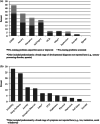Psychiatric problems during the COVID-19 pandemic in children with autism spectrum disorder
- PMID: 34231323
- PMCID: PMC8420610
- DOI: 10.1002/aur.2574
Psychiatric problems during the COVID-19 pandemic in children with autism spectrum disorder
Abstract
Children with autism spectrum disorder (ASD) are at elevated risk for psychiatric problems in response to the COVID-19 pandemic. This risk is due to their high rates of pre-pandemic psychiatric comorbidities and the pandemic's disruption to routines and access to necessary supports. Prior research has indicated that children with ASD may experience a worsening of specific psychiatric symptoms in response to COVID-19, though this body of work is limited in scope. The present study expands this literature by examining specific types of psychiatric problems that emerged about 2 months after the onset of the pandemic, and risk factors predicting changes in these psychiatric symptoms. Parents of children with a confirmed ASD diagnosis (N = 257), who enrolled in a clinic registry at an outpatient specialty autism center, were included in this study. All data were gathered online via customized and standardized questionnaires. Results showed that 59% of children experienced either a worsening of their pre-pandemic psychiatric diagnoses and/or the development of new psychiatric symptoms during the pandemic. Multivariable regression models indicated that risk factors for increased psychiatric problems included child understanding of COVID-19, COVID-19 illness in the family, low family income, and elevated parental depression and anxiety symptoms (all p < 0.05). Findings from this study emphasize the urgent need to provide effective and accessible psychiatric services for children with ASD and their families during and after the pandemic. LAY SUMMARY: Children with ASD are at high risk for psychiatric problems during the COVID-19 pandemic. We found that 59% of children in our clinical sample are experiencing increased psychiatric problems. The child's understanding of COVID-19, COVID-19 illness in the family, low family income, and depression and anxiety symptoms in the parent increase the risk for poor mental health during the pandemic. These findings indicate the importance of helping children with ASD access mental health treatment during COVID-19.
Keywords: COVID-19; autism spectrum disorder; children; psychiatric problems.
© 2021 International Society for Autism Research and Wiley Periodicals LLC.
Conflict of interest statement
Dr. Vasa receives royalties for an edited book on childhood anxiety disorders published by Humana Press.
Figures
References
-
- Amorim, R. , Catarino, S. , Miragaia, P. , Ferreras, C. , Viana, V. , & Guardiano, M. (2020). The impact of COVID‐19 on children with autism spectrum disorder. Impacto de la COVID‐19 en niños con trastorno del espectro autista. Revista de Neurologia, 71(8), 285–291. 10.33588/rn.7108.2020381 - DOI - PubMed
-
- Asbury, K. , Fox, L. , Deniz, E. , Code, A. , & Toseeb, U. (2020). How is COVID‐19 affecting the mental health of children with special educational needs and disabilities and their families? Journal of Autism and Developmental Disorders, 51(5), 1772–1780. 10.1007/s10803-020-04577-2 - DOI - PMC - PubMed
-
- Bearss, K. , Burrell, T. L. , Challa, S. A. , Postorino, V. , Gillespie, S. E. , Crooks, C. , & Scahill, L. (2018). Feasibility of parent training via telehealth for children with autism spectrum disorder and disruptive behavior: A demonstration pilot. Journal of Autism and Developmental Disorders, 48(4), 1020–1030. 10.1007/s10803-017-3363-2 - DOI - PubMed


